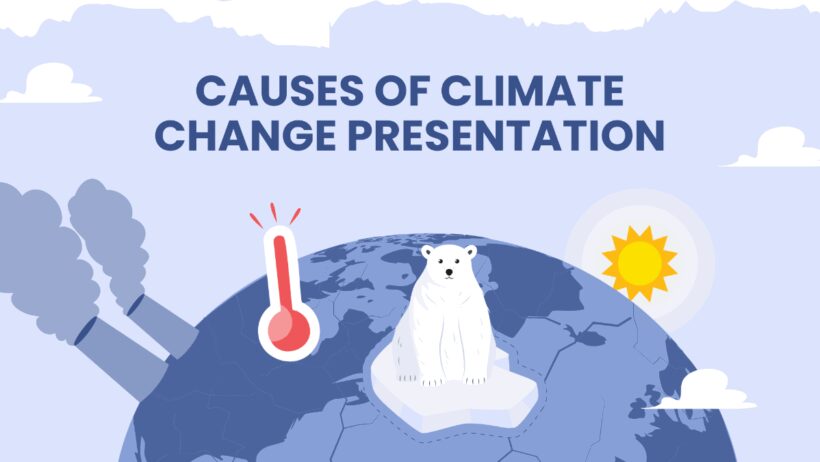Climate change is an intricate phenomenon, influenced by a plethora of factors that span both natural and anthropogenic realms. Understanding these causes is fundamental in addressing the concerns surrounding global warming and its far-reaching repercussions on ecosystems and human societies alike. From towering volcanoes to everyday automobiles, the catalysts of climate change weave an elaborate tapestry of environmental dynamics.
To commence, it is imperative to examine natural processes—the interactions within the Earth’s systems that have existed long before industrialization. Among these, volcanic eruptions stand out as monumental events that can induce rapid climatic shifts. When a volcano erupts, it releases a plethora of gases, with sulfur dioxide (SO2) being particularly notable. This gas can form sulfate aerosols in the atmosphere, reflecting sunlight and leading to a temporary cooling effect. However, the longer-term impact results from the release of carbon dioxide (CO2), a potent greenhouse gas that contributes to atmospheric warming. Historical data reveal several instances wherein extensive volcanic activity correlates with shifts in climatic conditions, underscoring their formidable role.
Another significant natural contributor to climate variation is solar radiation. The Earth’s climate is intrinsically linked to solar cycles, namely variations in solar output and orientation. Over millennia, these cyclical changes have precipitated ice ages and warmer epochs, dictated by the intensity and distribution of sunlight reaching our planet. While the influence of solar radiation on contemporary climate change is negligible compared to human activities, it underscores the necessity of evaluating all contributing factors in a holistic manner.
Transitioning from natural to anthropogenic influences, one cannot overlook the profound impact of industrialization. The combustion of fossil fuels—primarily coal, oil, and natural gas—stands as the cornerstone of modern energy systems but also as a principal driver of climate change. Through the release of CO2 during combustion processes, fossil fuel consumption accounts for a substantial proportion of global greenhouse gas emissions. This correlation evidences a direct line from our energy choices to atmospheric alterations.
Moreover, deforestation exemplifies another anthropogenic activity exacerbating climate change. Trees play a crucial role in carbon sequestration, absorbing CO2 from the atmosphere. Yet, rampant deforestation, driven by agricultural expansion, urbanization, and logging, diminishes this critical carbon sink. The resultant increase in atmospheric carbon compounds the effects of greenhouse gases, creating a feedback loop that accelerates climate change. The loss of biodiversity arising from habitat destruction further complicates ecosystem resilience, leading to a decline in overall ecological health.
Transportation is yet another sector with a significant climate footprint. Automobiles, planes, ships, and other forms of transportation predominantly rely on fossil fuels, releasing an assortment of greenhouse gases and pollutants. This sector alone contributes to nearly a quarter of global greenhouse gas emissions, necessitating a reassessment of transportation technologies and practices. The advent of electric vehicles (EVs) and advancements in public transportation serve as crucial measures towards mitigating these emissions. However, the challenge remains in ensuring that the electricity powering EVs is derived from renewable sources, thereby closing the loop on sustainable energy.
A lesser-known but equally pertinent contributor to climate change is agriculture. Agriculture, particularly livestock farming, generates significant quantities of methane (CH4) and nitrous oxide (N2O)—both potent greenhouse gases with much higher warming potentials than CO2. Methane emissions originate from enteric fermentation in ruminants, manure management, and paddy rice cultivation. Additionally, fertilizers, essential for crop production, contribute to nitrous oxide emissions through soil degradation and nutrient runoff. The food production system thus presents both a challenge and an opportunity for sustainability, as transitioning to more efficient practices could substantially mitigate emissions.
Urbanization also plays a critical role in shaping climate outcomes. Expanding cities create urban heat islands—localized areas of increased temperature due to human activities and infrastructure. This phenomenon, coupled with increased energy demands, further exacerbates the reliance on fossil fuels, particularly in developing nations. Strategies such as green architecture, increased green spaces, and sustainable urban planning exemplify proactive approaches to counteracting these impacts and promoting resilience in urban environments.
In recent years, climate change deniers have gained prominence, positing alternative narratives that downplay or dispute the scientific consensus surrounding anthropogenic climate change. Such rhetoric obscures the progress needed to confront this pressing issue effectively. It is critical to understand that climate change is a multifactorial reality, encompassing various interacting elements. Knowledge dissemination, public engagement, and policy frameworks must prioritize scientific evidence, fostering informed discussions about solutions.
Ultimately, addressing climate change requires a concerted effort across multiple sectors—energy, transportation, agriculture, and urban planning. Innovative technologies, coupled with systemic changes in consumption patterns and governance, are requisites for steering society towards sustainability. The challenge is daunting, yet the intersection of human ingenuity and collaborative action offers a pathway toward a more resilient future. Acknowledging the multitude of causes, from volcanoes to cars, empowers us to comprehend climate change in its totality and mobilizes our efforts toward actionable solutions.
In summary, climate change arises from a complexity of factors, each interwoven within the fabric of Earth’s systems. While natural processes like volcanic eruptions and solar radiation have shaped the climate for millennia, human activities, particularly fossil fuel consumption, deforestation, and unsustainable agricultural practices, now dominate the narrative of global warming. Recognizing these diverse contributors equips society to better confront the climate crisis, cultivate adaptive capacity, and foster a sustainable relationship with our planet.






